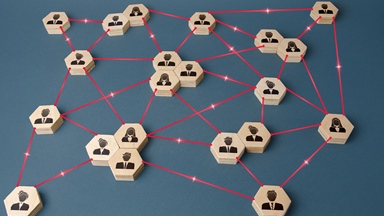Loading component...
At a glance
Decentralised Autonomous Organisations (DAOs) are a new form of online, decentralised organisational structure.
DAOs are generally member-led, with some form of treasury (often denominated in crypto-tokens) and are gaining importance in the context of crypto-token networks.
Many DAOs hold assets of significant value, but their legal, regulatory and tax status is unclear.
These blockchain-based community organisations enable members to align around a common purpose. To participate, members purchase tokens that often carry voting rights.
Decisions are made via proposals, which the DAO members vote on.
Given that this can all be done without centralised leadership and management, there is a growing view that DAOs could disrupt traditional corporate governance practices.
Joni Pirovich, principal of BADASL, a law firm that provides legal and tax advice about blockchain and digital assets, says many accountants and finance professionals are confused about DAOs.
Nevertheless, she says there are real opportunities for experts who can advise clients on DAOs and their use.
“Even though it’s new technology, there are still a lot of traditional principles of common sense and corporate governance that accountants can bring to bear as people transact with tokens and seek to understand their rights or legal exposure when getting involved with a DAO,” Pirovich says.
“We need more professional advisers, and we need them quickly.”
How DAOs work
Famous DAO examples include token exchange Uniswap, lending platform MakerDAO, virtual world Decentraland and digital collectible investment group Pleasr.
If a DAO needs funding, it can enter a funding phase, in which a fixed number of tokens are typically distributed to generate funds.
A number of projects still do not retain legal advice to characterise the token for legal and tax purposes, which has confused many lawyers, tax agents, token holders and token issuers about their rights and obligations.
The rules that govern a DAO are stored in computer code as part of smart contracts in a blockchain.
Where a DAO is used to govern digital contracts, which can be programmed to self-execute when a set of predefined conditions is fulfilled, it is unclear who the legal person is or should be if something goes wrong, because DAO governance still involves humans to make certain decisions – not everything is in code.
Dr Jana Schmitz, Digital Economy Policy Lead at CPA Australia, notes that DAOs provide an operating system for individuals who neither know nor trust each other, who might also live in different geographical areas and speak different languages.
Instead of legal contracts managing the relations of the DAO participants, all agreements are in the form of open-source code that is self-enforced by majority consensus of all network actors.
DAOs don’t necessarily have a hierarchical structure except for the code, which distinguishes them from conventional hierarchical companies with boards, CEOs and other professional managers.
Once deployed, a DAO should be independent of its creator and can’t be censored by one single person or entity, but instead by a predefined majority of the DAO’s participants. This adds to the sense that DAOs are more democratic than typical companies.
While in theory there is a flat power structure, Schmitz says the more tokens a person holds, the more voting rights they have, which is akin to majority shareholders having greater sway in a traditional company.
Corporate governance evolution
Supporters believe DAOs are a radically different ownership model that can help build new digital organisations and platforms that are owned by their users and governed in fair and transparent ways.
However, legal question marks hang over the entities, including fears they could hit legal roadblocks if regulators decide that the tokens that they issue are securities. This would mean they need to go through the same registration process as a company selling stocks or bonds.
Furthermore, some critics suggest that DAOs work on the basis of the ‘“rule of code”, rather than the “rule of law”.
The Australian Securities and Investments Commission is still working out who in a DAO the regulator can hold accountable if something goes awry.
In a traditional company, the board or CEO typically falls on their sword in such cases, but in a sufficiently decentralised DAO, the onus of responsibility is less clear, prompting calls for governments to establish a legislative framework for the standards of legal recognition of DAOs.
“From a legal and governance perspective, we are used to holding someone to account if things go wrong,” Schmitz says.
“With a DAO, that’s more difficult because there’s no board or CEO who can be sued or otherwise held accountable. That’s a risk, and it goes to the need for more clearly defined legal definition and frameworks around DAOs.”
Schmitz adds that, at the moment, people who have invested in DAOs are not clearly protected by any consumer protection laws.
“If DAO protocols collapse or fail to operate appropriately, then investors’ money may be gone.”
Ethical clarity
With DAOs on the rise, Pirovich wants accounting standard-setters and other professional groups to clarify rules around the accounting treatment of tokens.
This would give accountants greater confidence in meeting their ethical requirements when advising clients who are engaging in token-related activities.
“The guidance that has been put out to date is really for people who acquire and hold tokens, not for issuers,” she explains.
“With these tokens largely being issued by DAOs or groups that claim to be DAOs, there’s just no guidance for an accountant to try to prepare financial statements for the issuers, whether they be in the form of NFTs or the fungible tokens like bitcoin or ether.”
Given such grey areas, Pirovich believes there is great potential for accounting professionals who want to focus on DAOs and other blockchain-related activities.
“There’s certainly a market for someone who wants to invest in themselves and be a specialist.”

